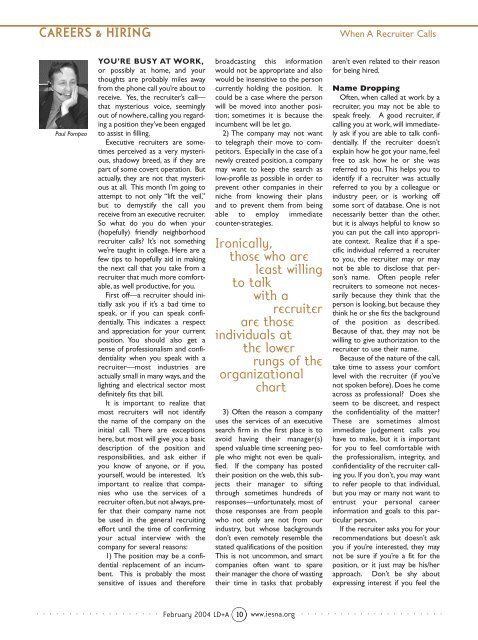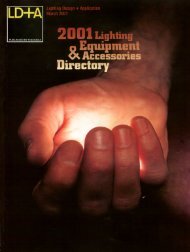april 000001 - Illuminating Engineering Society
april 000001 - Illuminating Engineering Society
april 000001 - Illuminating Engineering Society
You also want an ePaper? Increase the reach of your titles
YUMPU automatically turns print PDFs into web optimized ePapers that Google loves.
CAREERS & HIRINGWhen A Recruiter CallsPaul PompeoYOU’RE BUSY AT WORK,or possibly at home, and yourthoughts are probably miles awayfrom the phone call you’re about toreceive. Yes, the recruiter’s call—that mysterious voice, seeminglyout of nowhere, calling you regardinga position they’ve been engagedto assist in filling.Executive recruiters are sometimesperceived as a very mysterious,shadowy breed, as if they arepart of some covert operation. Butactually, they are not that mysteriousat all. This month I’m going toattempt to not only “lift the veil,”but to demystify the call youreceive from an executive recruiter.So what do you do when your(hopefully) friendly neighborhoodrecruiter calls? It’s not somethingwe’re taught in college. Here are afew tips to hopefully aid in makingthe next call that you take from arecruiter that much more comfortable,as well productive, for you.First off—a recruiter should initiallyask you if it’s a bad time tospeak, or if you can speak confidentially.This indicates a respectand appreciation for your currentposition. You should also get asense of professionalism and confidentialitywhen you speak with arecruiter—most industries areactually small in many ways, and thelighting and electrical sector mostdefinitely fits that bill.It is important to realize thatmost recruiters will not identifythe name of the company on theinitial call. There are exceptionshere, but most will give you a basicdescription of the position andresponsibilities, and ask either ifyou know of anyone, or if you,yourself, would be interested. It’simportant to realize that companieswho use the services of arecruiter often, but not always, preferthat their company name notbe used in the general recruitingeffort until the time of confirmingyour actual interview with thecompany for several reasons:1) The position may be a confidentialreplacement of an incumbent.This is probably the mostsensitive of issues and thereforebroadcasting this informationwould not be appropriate and alsowould be insensitive to the personcurrently holding the position. Itcould be a case where the personwill be moved into another position;sometimes it is because theincumbent will be let go.2) The company may not wantto telegraph their move to competitors.Especially in the case of anewly created position, a companymay want to keep the search aslow-profile as possible in order toprevent other companies in theirniche from knowing their plansand to prevent them from beingable to employ immediatecounter-strategies.Ironically,those who areleast willingto talkwith arecruiterare thoseindividuals atthe lowerrungs of theorganizationalchart3) Often the reason a companyuses the services of an executivesearch firm in the first place is toavoid having their manager(s)spend valuable time screening peoplewho might not even be qualified.If the company has postedtheir position on the web, this subjectstheir manager to siftingthrough sometimes hundreds ofresponses—unfortunately, most ofthose responses are from peoplewho not only are not from ourindustry, but whose backgroundsdon’t even remotely resemble thestated qualifications of the positionThis is not uncommon, and smartcompanies often want to sparetheir manager the chore of wastingtheir time in tasks that probablyaren’t even related to their reasonfor being hired.Name DroppingOften, when called at work by arecruiter, you may not be able tospeak freely. A good recruiter, ifcalling you at work, will immediatelyask if you are able to talk confidentially.If the recruiter doesn’texplain how he got your name, feelfree to ask how he or she wasreferred to you. This helps you toidentify if a recruiter was actuallyreferred to you by a colleague orindustry peer, or is working offsome sort of database. One is notnecessarily better than the other,but it is always helpful to know soyou can put the call into appropriatecontext. Realize that if a specificindividual referred a recruiterto you, the recruiter may or maynot be able to disclose that person’sname. Often people referrecruiters to someone not necessarilybecause they think that theperson is looking, but because theythink he or she fits the backgroundof the position as described.Because of that, they may not bewilling to give authorization to therecruiter to use their name.Because of the nature of the call,take time to assess your comfortlevel with the recruiter (if you’venot spoken before). Does he comeacross as professional? Does sheseem to be discreet, and respectthe confidentiality of the matter?These are sometimes almostimmediate judgement calls youhave to make, but it is importantfor you to feel comfortable withthe professionalism, integrity, andconfidentiality of the recruiter callingyou. If you don’t, you may wantto refer people to that individual,but you may or many not want toentrust your personal careerinformation and goals to this particularperson.If the recruiter asks you for yourrecommendations but doesn’t askyou if you’re interested, they maynot be sure if you’re a fit for theposition, or it just may be his/herapproach. Don’t be shy aboutexpressing interest if you feel the. . . . . . . . . . . . . . . . . . . . February . . . . 2004 . . . LD+A . . . . 10. . www.iesna.org. . . . . . . . . . . . . . . . . . . . . . . . . . . . .
















